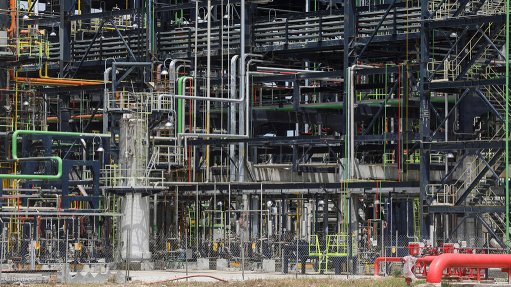Opinion: AfCFTA can support the development of local OEMs, unlock economic growth on the continent
In this opinion article, ACTOM CEO and Manufacturing Circle chairperson Mervyn Naidoo writes about the importance of the African Continental Free Trade Agreement (AfCFTA) and how it can support the development of original-equipment manufacturers (OEMs) on the continent.
In most African countries, local manufacturers tend to look towards imported equipment when choosing an original-equipment manufacturer (OEM), often selecting imports from the Far East due to the lower costs associated with these products. This is mainly because many African countries lack the capabilities and manufacturing capacity to locally produce equipment across various industry segments, which often makes the procurement of equipment in-country difficult and expensive.
This means that, by default, many African manufacturers companies turn to the West, Europe or most commonly the East – particularly China – to source equipment. However, the benefits of lower upfront costs are generally negated by the lifecycle costs of the imported products.
On the other hand, equipment manufactured by local OEMs has the benefit of being backed up by local competence and intellectual property, providing equipment owners with support and maintenance throughout the product's lifecycle. As is often the case, imported equipment can fast become useless and obsolete due to a lack of spare parts and expertise to maintain it.
ECONOMIC STIMULUS
Additionally, developing a local vertical supply chain that can support equipment from cradle to grave brings wider economic benefits to a country, including an economic stimulus that ultimately leads to the expansion of industry, job creation and increased gross domestic product. Typically, manufacturing multiplies employment – for every job created, many more are created in the vertical supply chain.
As many African countries grapple with high unemployment rates, developing and growing local and regional OEM capabilities would see more people become economically active, which would drive greater demand for resources such as electricity, water, data and service. An economically active population also creates demand for infrastructure growth and services, in turn boosting demand for locally manufactured equipment.
Hence, the reasons for African countries to actively look at using the existing demand for equipment manufacturing to stimulate regional economies and create jobs, as opposed to importing goods and benefiting other economies, are compelling.
While the generally lower cost positioning of equipment imported from the East does make it tough for African manufacturers to compete, it is not impossible. African manufacturers need to look aggressively at how to position themselves to be competitive against foreign OEMs, and the key to this will be to leverage the benefits of the AfCFTA.
INCENTIVISE TRADE
The reduction in tariffs under AfCFTA will automatically contribute to promoting the use of locally manufactured goods on the continent, as it will introduce an element of increased competitiveness and open borders to facilitate trade between countries. At the same time, governments will have to play their part to incentivise trade between African countries, which will ultimately stimulate regional economies across the continent.
One of the key outcomes that must flow from AfCFTA is that African countries must effectively meet the demands of manufacturers on the continent by effectually exploiting the readily available raw materials needed for equipment manufacturing. Many of the resources required to produce these products are found on the continent and these should be beneficiated locally to add value.
The establishment of local manufacturing plants and factories will in turn stimulate economic growth and ensure sustainability in terms of cradle-to-grave lifecycle support for locally manufactured equipment. This will unlock economic growth in Africa. If done wisely, AfCFTA can help to boost African economies and change the plight of many countries on the continent.
Article Enquiry
Email Article
Save Article
Feedback
To advertise email advertising@creamermedia.co.za or click here
Announcements
What's On
Subscribe to improve your user experience...
Option 1 (equivalent of R125 a month):
Receive a weekly copy of Creamer Media's Engineering News & Mining Weekly magazine
(print copy for those in South Africa and e-magazine for those outside of South Africa)
Receive daily email newsletters
Access to full search results
Access archive of magazine back copies
Access to Projects in Progress
Access to ONE Research Report of your choice in PDF format
Option 2 (equivalent of R375 a month):
All benefits from Option 1
PLUS
Access to Creamer Media's Research Channel Africa for ALL Research Reports, in PDF format, on various industrial and mining sectors
including Electricity; Water; Energy Transition; Hydrogen; Roads, Rail and Ports; Coal; Gold; Platinum; Battery Metals; etc.
Already a subscriber?
Forgotten your password?
Receive weekly copy of Creamer Media's Engineering News & Mining Weekly magazine (print copy for those in South Africa and e-magazine for those outside of South Africa)
➕
Recieve daily email newsletters
➕
Access to full search results
➕
Access archive of magazine back copies
➕
Access to Projects in Progress
➕
Access to ONE Research Report of your choice in PDF format
RESEARCH CHANNEL AFRICA
R4500 (equivalent of R375 a month)
SUBSCRIBEAll benefits from Option 1
➕
Access to Creamer Media's Research Channel Africa for ALL Research Reports on various industrial and mining sectors, in PDF format, including on:
Electricity
➕
Water
➕
Energy Transition
➕
Hydrogen
➕
Roads, Rail and Ports
➕
Coal
➕
Gold
➕
Platinum
➕
Battery Metals
➕
etc.
Receive all benefits from Option 1 or Option 2 delivered to numerous people at your company
➕
Multiple User names and Passwords for simultaneous log-ins
➕
Intranet integration access to all in your organisation




















